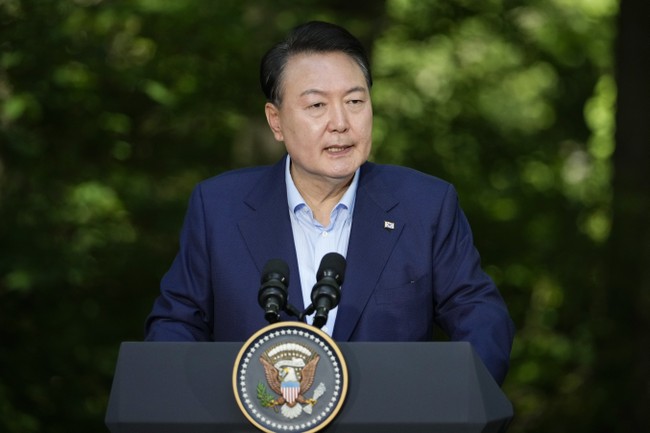We support our Publishers and Content Creators. You can view this story on their website by CLICKING HERE.

South Korean President Yoon Suk Yeol may be the worst politician presently walking the earth.
After declaring martial law on December 3, the clueless Yoon changed his mind and withdrew the order. By then, it was too late. Tens of thousands of Koreans poured into the streets to protest the declaration of martial law, and the Korean National Assembly had met to vote down the decree. An impeachment vote on December 7 failed when most of Yoon’s People Power Party deputies walked out, denying the majority Democratic Party a quorum.
Advertisement
After a week in which Yoon still refused to resign and evidence emerged that Yoon planned to arrest several deputies on “anti-state” charges, 12 members of his own party defected on the second impeachment vote on Saturday, giving the opposition the two-thirds majority for a successful impeachment. The vote was 204 in favor of impeachment, “with 85 against, three abstentions and eight invalid ballots,” according to Reuters. Most People Power Party delegates refused to vote.
What happens next? Yoon is stripped of his power, but not out of office. The Constitutional Court will determine whether the vote was legal or not, and that might take as long as six months. In the meantime, Yoon may be arrested on insurrection charges, or even charged with treason for his attempt to overthrow the government.
Exercising executive authority will be Prime Minister Han Duck-soo, “a career civil servant who holds the No. 2 position in government,” according to the Washington Post. He will act as interim president until the Constitutional Court decides the issue.
Still, Han will be a caretaker, and the leadership vacuum coincides with the presidential transition in the United States and the return of Donald Trump to the White House.
Analysts say this power vacuum at the helm of one of the United States’ key allies in Asia could put Seoul on weak footing with Washington and compromise its ability to swiftly respond to adjustments in foreign policy or trade. Trump has threatened to seek higher tariffs and has repeatedly suggested that Seoul should pay high sums for the 30,000-odd U.S. troops stationed on the Korean Peninsula.
It is unclear whether the Constitutional Court, which serves the role of the U.S. Senate in the American presidential impeachment process, will uphold the impeachment vote against Yoon.
Advertisement
At least six members of the nine-member Constitutional Court must vote to remove Yoon. There are currently three vacancies on the court and four members were appointed by Yoon. That means that at least one Yoon-appointed judge will have to vote to kick him out of office.
After the impeachment vote, Yoon was defiant.
“Although I am stopping for now, the journey I have walked with the people over the past two and a half years toward the future must never come to a halt,” Yoon said. “I will never give up.”
In that same speech, he claimed that North Korea had hacked the election and his martial law declaration was legal.
Yoon said the country’s National Election Commission was hacked by North Korea last year, but the independent agency refused to cooperate in an investigation and inspection of its system to safeguard integrity.
He said the refusal was enough to raise questions about the integrity of the April 2024 election and led him to declare martial law.
Yoon’s People Power Party (PPP) suffered a crushing defeat in the April election, allowing the Democratic Party overwhelming control of the single-chamber assembly. Even so, the opposition needs eight members of the PPP to vote with them for the president to be impeached.
It will take a while, but Yoon will eventually be removed. It’s certain that North Korea will seek to exploit the political paralysis, although Leader Kim Jong-un wouldn’t want to tangle militarily with his neighbors to the south.
Advertisement

 Conservative
Conservative  Search
Search Trending
Trending Current News
Current News 






